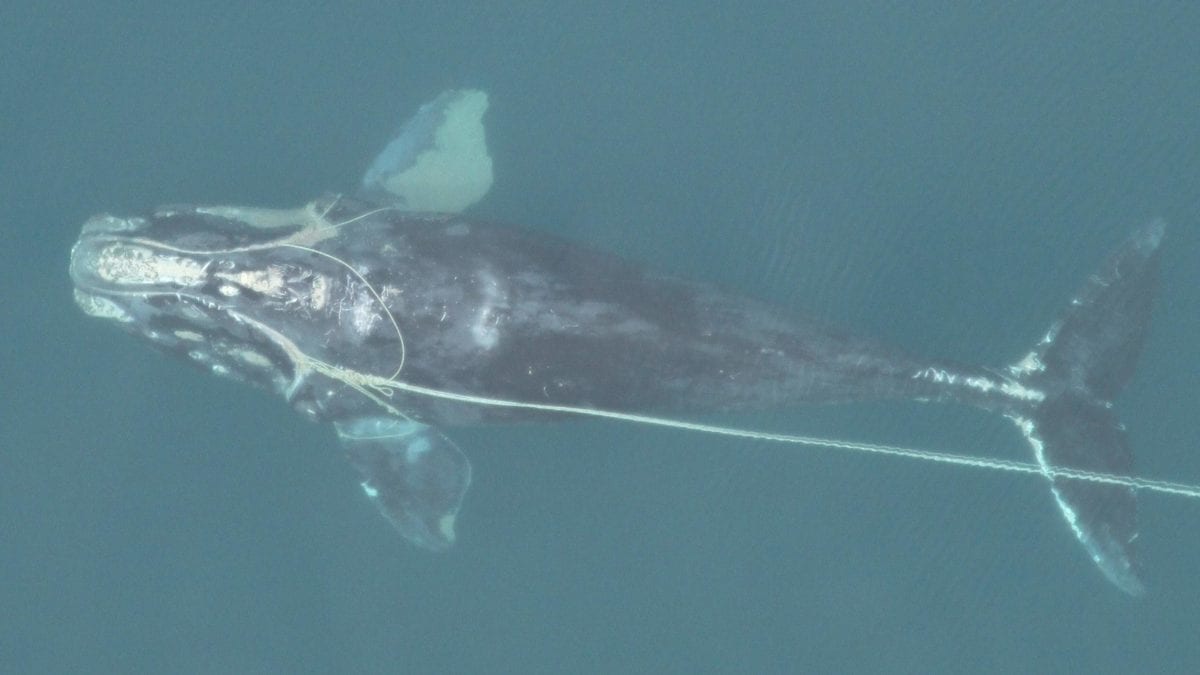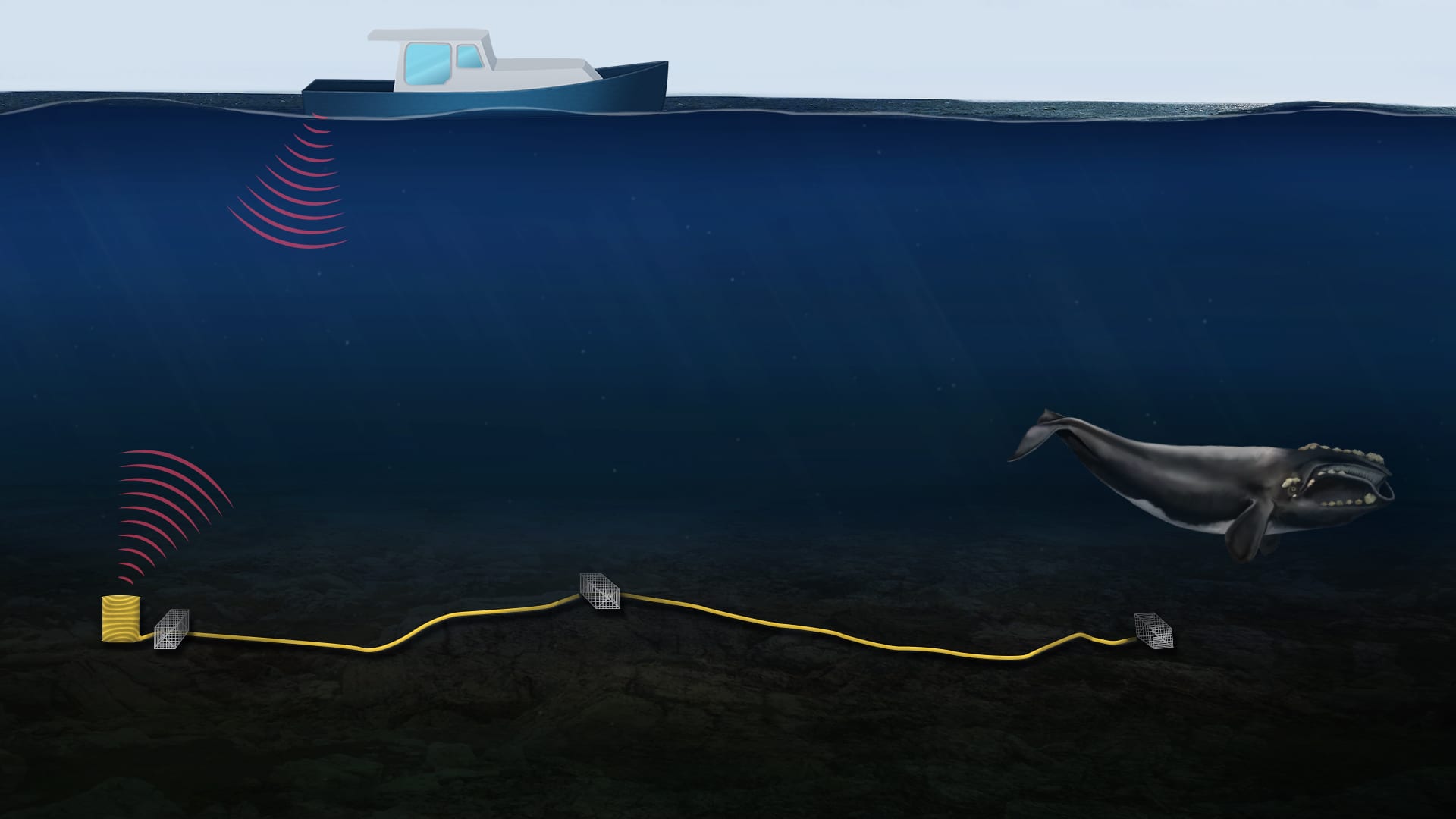SeaWorld & Busch Gardens conservation fund commits $900,000 to protect critically endangered North Atlantic right whales
 An emaciated, entangled North Atlantic right whale swimming with fishing trap rope around both flippers, through its mouth, and dragging behind it. Image: Florida Fish and Wildlife Commission, NOAA Permit #594-1759
An emaciated, entangled North Atlantic right whale swimming with fishing trap rope around both flippers, through its mouth, and dragging behind it. Image: Florida Fish and Wildlife Commission, NOAA Permit #594-1759 November 14, 2019
The SeaWorld & Busch Gardens Conservation Fund announced that it has committed $900,000 over the next three years in the fight to save the critically endangered North Atlantic Right Whale. The announcement was made by Dr. Michael Moore of the Woods Hole Oceanographic Institution, alongside Dr. Hendrik Nollens, Corporate Vice President of Animal Health and Welfare at SeaWorld and President of the SeaWorld Conservation Fund, during yesterday’s 2019 Ropeless Consortium meeting, an annual summit to help protect marine animals, at the University of Southern Maine in Portland.
The funding provided by the SeaWorld Conservation Fund will be primarily used to test alternative non-lethal fishing gear. Whales and sea turtles commonly entangle in ropes that connect crab or lobster traps on the sea floor to buoys on the sea surface. These ropes allow fishermen to haul their traps to the sea surface, and the buoy allows fishermen to locate gear. Removing this end line from trap and pot fishing gear will significantly reduce or even eliminate entanglements. There are promising prototypes available for evaluation by scientists, regulators and fishermen, but few resources for proper testing of these systems. Support by the SeaWorld Conservation Fund will be used to evaluate the cost, the operational impact to the fishermen and the safety for the whales, as well as advance public awareness of the issues.
“This commitment by the SeaWorld Conservation Fund is absolutely vital in helping protect this iconic species," says Moore. "The North Atlantic right whale lives mostly in a highly urbanized ocean, where ship strikes and fishing gear entanglement is a constant concern. We must find a way for whales, turtles and other species vulnerable to entanglement to coexist with sustainable seafood harvests.”
“SeaWorld is committed to marine education and conservation and our partnership with SeaWorld will enable much greater public awareness of the huge conservation and animal welfare concern that entanglement represents," he adds. "This awareness will hopefully swing the balance towards educated seafood consumers being willing to pay the premium that whale friendly harvesting techniques will likely need.”
Entanglements in trap and pot fishing gear are a serious threat to many endangered whales and sea turtles, and North Atlantic right whales are most heavily affected, and some of the world’s most critically endangered marine animals. The species is in its seventh consecutive year of decline, with only about 411 whales left. Approximately 85 percent of all North Atlantic right whales bear scars from being entangled in fishing gear at least once in their lives, and over 50 percent have been entangled at least twice. Eighty-two percent of documented North Atlantic right whale mortality is attributable to fishing gear entanglements.

Proposed buoyless alternative to traditional rope system. Trap is acoustically located, identified and retrieved. Illustration by Natalie Renier, Woods Hole Oceanographic Institution
“In precolonial times, North Atlantic right whales were a relatively common sight on the East Coast, but today the very existence of the entire species is at risk: fewer than 100 reproductively-active females remain in a population of approximately 411 whales total,” Moore explains.
“The New England Aquarium has long recognized that the least risky fishing method for whales is one that removes ropes from the water column. We applaud WHOI’s commitment to ropeless fishing as a potential solution for avoiding the extinction of the North Atlantic right whale,” says Tim Werner, Senior Scientist, Anderson Cabot Center for Ocean Life at the New England Aquarium.
SeaWorld’s Nollens adds, “The Fund is dedicated to helping species in need, and we are proud to partner with Dr. Moore and his team on this critical initiative. The plight of the North Atlantic right whale is yet another symptom of man’s impact on the very same ocean on which a large and growing part of the U.S. economy relies. Time is running out but it is our hope to be a key partner in saving this species.”
###
About the SeaWorld & Busch Gardens Conservation Fund
Since its inception in 2003, the Fund has granted over $17.5 million to more than 1,200 projects with 81 organizations in 70 countries around the world. Its grantees, or benefactors, include world-renowned conservation organizations such as World Wildlife Fund, The Nature Conservancy, Wilderness Foundation Africa, the Panamerican Conservation Association and The Audubon Society. In addition, the Fund supports lesser-known grassroots groups who are committed to protecting and preserving their local communities. The Fund also receives donations from in-park guests, community friends, individual donors and corporate partners. SeaWorld Parks & Entertainment covers all administrative costs for the Fund, enabling 100 percent of all incoming donations to go directly to conservation. Learn more at www.swbg-conservationfund.org
About WHOI
The Woods Hole Oceanographic Institution is a private, non-profit organization on Cape Cod, Mass., dedicated to marine research, engineering, and higher education. Established in 1930 on a recommendation from the National Academy of Sciences, its primary mission is to understand the oceans and their interaction with the Earth as a whole, and to communicate a basic understanding of the oceans’ role in the changing global environment. For more information, please visit www.whoi.edu
